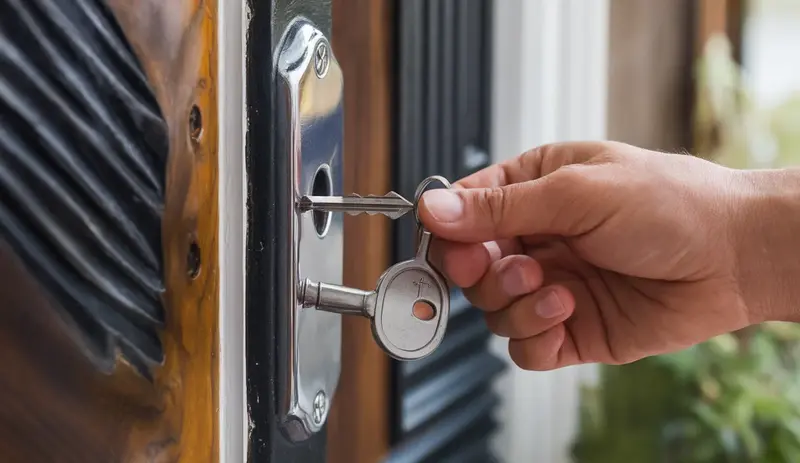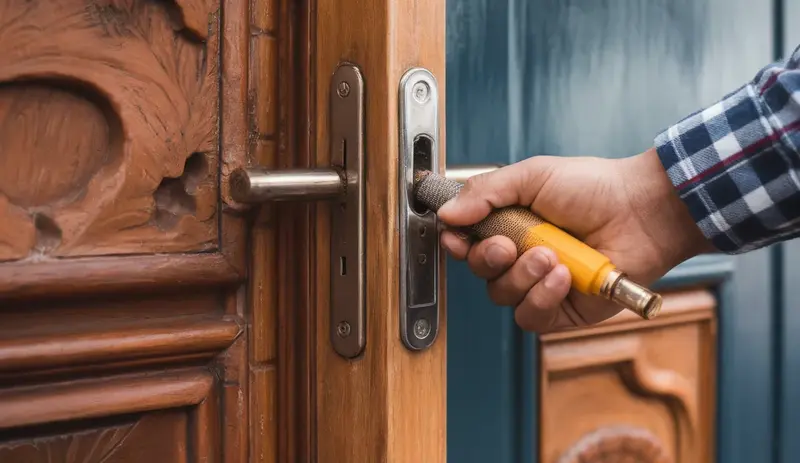
Picture this: You’re standing outside your front door, arms full of grocery bags, fumbling with a set of keys that always seem to slip through your fingers at the worst possible moment. Sound familiar? Most of us have been there – wrestling with traditional locks that feel like they were designed to test our patience.
But what if there was a better way? Electronic locks have been popping up everywhere lately, promising a solution to our key-related headaches.
But are they really as secure as everyone claims? That’s exactly what we’re going to dig into. By the end of this guide, you’ll know exactly how electronic locks stack up against the tried-and-true traditional locks we’ve used for decades.
The Old School vs. The New Cool: Understanding Lock Basics
Let’s discuss locks in a way that doesn’t make them seem like a tedious technical manual. Old-fashioned locks have been around forever-those mechanisms of metal, with tumblers and pins, that we’ve seen in every caper movie.
They work via a simple but brilliant mechanical dance. When you insert the key, those tiny metal pins inside the lock lift to exactly the right height, allowing the cylinder to turn and the lock to open.
Electronic locks, conversely, are akin to the cool new kid on the block. They use electrical circuits, codes, and sometimes even biometric data like fingerprints instead of physical pins. Envision a lock that acknowledges you before you even touch it—that’s not science fiction anymore; it’s modern security.
Security Myths: What Criminals Really Think About Different Lock Types
Here’s something many individuals don’t comprehend: paths of least resistance entice many criminals. Security experts consistently inform me that visible, sturdy locks give many deterred criminals second thoughts. Yet, for some, those same locks become their challenge du jour. Traditional, complex-key-system locks rival many path-of-least-resistance locks when it comes to the challenges they present to would-be lock pickers and line cutters.
Some psychological benefits accompany electronic locks. Their very presence can cause a would-be intruder to hesitate. They indicate a type of investment in security that suggests the house is just not worth the effort to break into.
You May Like: Can Locksmiths Install Smart Locks In 2025?
Pros and Cons of Electronic Locks: The Honest Truth
What does this mean for home security? The electronic lock is a combination of everything good about the traditional lock and the key and the smart technology we have today.
Imagine life without keys, for one thing, or being able to grant access to a house sitter with a digital code that expires, maintaining your cozy home’s stronghold even while you’re overseas. No more worrying about where your keys are, or if they’ve been duplicated.
However-and this is essential to understand-electronic locks are not infallible. They depend on batteries, may experience electrical failures, and could be open to more advanced hacking methods. An old-fashioned lock won’t fail because of a drained power supply.
When Technology Fails: Understanding Electronic Lock Vulnerabilities
Let’s be honest about possible problems. Electronic locks face some of the same difficulties as any electronic device, like power outages, battery depletion, and, on very rare occasions, complex electronic glitches that cause the lock to malfunction.
A few modern criminals might even try to hack the digital system. But most contemporary electronic locks have more than adequate protection against all these potential problems.
You need to select a brand with a solid reputation, but the more critical part is understanding your particular security requirements. Not every brand of electronic lock offers the same level of security, and not every type of electronic lock is suitable for every application. So, what do you really need to know about electronic locks before deciding whether to install them in your home? Check out Doctor Lock for expert advice.
Cost vs. Protection: Are Electronic Locks Worth the Investment?
The budget is always a necessary factor to consider. Basic electronic locks begin at about $100, while more advanced variants can set a person back several hundred dollars. But can you really put a price on peace of mind?
If you have a tighter budget, you can consider a hybrid solution. Some locks combine traditional key entry and electronic functionality, giving you the best of both worlds and allowing you to save up.
Regardless of what you spend, be sure the lock you choose is right for your lifestyle and home. It should offer real security using whatever method of entry you prefer to allow.
Keep in mind that the most effective lock is the one you will consistently use and that will feel comfortable for you. When it comes to securing your space, tech should be your ally. For local lock installation and consultation, visit our Google Maps location.
Final Words
The bottom line is that no lock is 100% perfect. Whether you choose electronic or traditional, the most important thing is being smart about your home security.
It’s not just about the lock – it’s about your overall approach to keeping your home safe. Don’t just read and forget. Take a look at your current locks and ask yourself: Are they really keeping my home as safe as I think?


